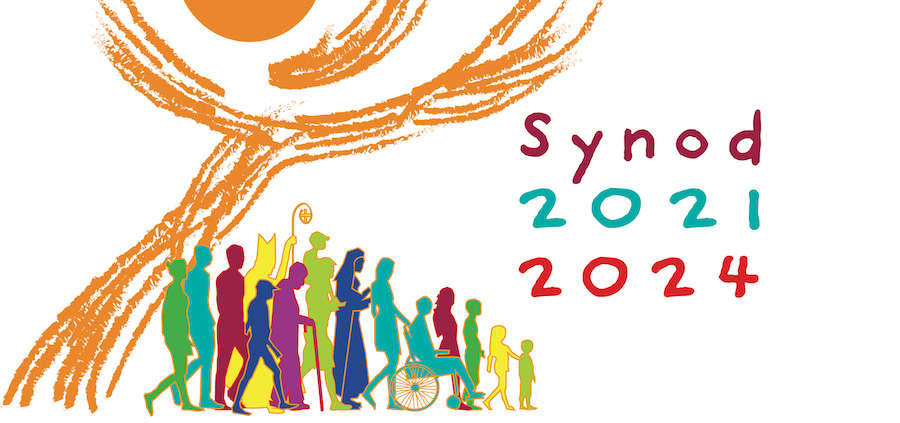Making and Remaking: Synod Report for October 17, 2023
Four Synod delegates took a break from their deliberations on section B.2 of the Instrumentum Laboris to speak to the press about their experience this morning.
Cardinal Cristóbal López Romero, SDB, the archbishop of Rabat, Morocco, spoke about the “foundation” for synodality created over the past two years as his diocese prepared for the assembly. “We were able to work together to kindle a new fire,” he said.
The cardinal praised the “fraternal environment, a free environment” that he has felt in the Synod hall. “We want to make sure the church will work in a synodal way,” he said.
In reference to the Synod as a multiyear process, he added, “We’re currently warming up, in a sense. We’re opening our eyes.”
Renée Köhler-Ryan, a professor at the University of Notre Dame Australia and delegate from the Continental Assembly of Oceania, characterized the Synod as “a spiritual event, an event of prayer.”
The Synod has provided “a sense of where we are as a universal church,” she said, including “how we can help each other more to do the work we need to do as the whole People of God.”
Also noteworthy is the “involvement of the laity” in the synodal process, Professor Köhler-Ryan said. She also shared that “motherhood and fatherhood are coming up in conversation in very real ways.”
Bishop Antony Randazzo of the diocese of Broken Bay, Australia, is a Synod delegate from the Federation of Catholic Bishops’ Conferences of Oceania (FCBCO). For him, the Synod is defined by “deep listening both to God in prayer and our sisters and brothers.”
Bishop Randazzo said that the region of Oceania represents a large part of the world’s geography, yet much of it is covered by water. This means that people are often isolated and communication can be a challenge. The Synod is an opportunity to “broaden” a Eurocentric way of thinking, he said, and dialogue with people who don’t come from the “traditional European centers of the church.”
It has been humbling “to listen to people who have a different experience than mine,” he said.
Fr. Agbonkhianmeghe Emmanuel Orobator, SI, dean of the Jesuit School of Theology at Santa Clara University in California and delegate from the Continental Assembly of Africa, called the Synod “a privileged moment” for a theologian.
“This is what a theologian lives for, because we’re part of an experience of a process of the church making and remaking itself,” he said. “For me, this experience is certainly one to live for, and definitely to work for.”
Fr. Orobator said that the synodal process “is probably going to be more important than the outcome.” Its overarching aim is to create “mechanisms and frameworks of listening, of dialoguing, and discerning.” This will allow the church to address individual issues in a way that “is constructive, not confrontational,” he said.
Fr. Orobator described how the 12 participants at his current table in the Synodal Assembly are all from different countries. Everyone brings unique insights, he said, adding that “to draw from the wisdom that is so embedded in this diversity” is essential for creating a synodal church.
“As far as I am concerned, the work of the synod will begin when the gatherings here actually conclude. Synodality is about how we live, and work, and journey, and boat, and swim, together. And that is going to be tested in the years to come,” he said.
Dr. Paolo Ruffini confirmed that there were 345 members present in today’s Synodal Assembly. Delegates are currently discussing section B.2 of the Instrumentum Laboris, “Co-responsibility in Mission.” Tomorrow they will begin section B.3, “Participation, Governance, and Authority.”
Recent topics of discussion have included “how to go beyond clerical models that may be a barrier to communion,” which could include changes to the language of canon law. Other topics have included the ordination of women deacons, the “relationship between leadership and service,” and developing “a new spiritual intelligence of the church,” Dr. Ruffini said.
Synod communications team member Sheila Pires said that the role of bishops in the church has also been addressed. The assembly has expressed the idea that “the bishop needs to understand that he alone is not the diocese,” Pires said. She added that bishops “shouldn’t shy away from listening to abuse victims.”
Fr. Orobator said that “there’s been no shortage of divergences and differences” in the Synodal Assembly, but that they were being taken up without hostility or animosity.
“What this process allows us to do is not only to name convergence and consensus but also divergence and difference,” he said.
“We are not speaking about clashes,” Cardinal López Romero said. “It’s more what unites us than what separates us. What moves us is joy, a common spirit.” ♦
Michael Centore
Editor, Today’s American Catholic




Leave a Reply
Want to join the discussion?Feel free to contribute!